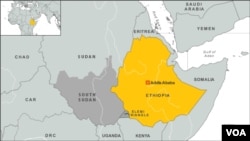This much is known: tension between the Oromia and Somali regions of Ethiopia turned deadly last week in clashes that claimed the lives of at least 18 people in the town of Awaday.
Many things remain unknown, including who exactly was killed and how they died, along with the question of what the violence might mean for Ethiopia and the federal government's long-running efforts to overcome or at least tamp down ethnic divisions.
In the short run, the federal government said it is taking steps to restore peace. State media Friday quoted the communications minister, Negeri Lencho, as saying authorities have arrested nearly 200 people in Oromia in connection with the violence.
Over the weekend, the governors of Oromia and Somali said they would work together to calm the situation, and Prime Minister Hailemariam Desalegn announced that federal police would protect key roads while security forces of both regions withdrew from conflict areas to reduce tension.
That may not be enough to ease the tension between Oromia and Somali. Like Ethiopia's seven other regions, Oromia and Somali were established on the basis of ethnicity and language, a system that critics say has exacerbated tensions. For years, the two regional governments have been embroiled in border conflicts stemming from disputes over grazing land and water.
Those clashes have intensified in recent weeks, say residents of the border area, who report seeing heavy machine guns and professional military forces.
Awaday violence
The most detailed accounts of last week's violence come from spokesmen of the two regional governments, both of whom spoke to VOA's Horn of Africa service.
Addisu Arega, the head of the Oromia region's communications bureau, said Friday members of the Oromo ethnic group were angered by the alleged recent detention and killing of four respected community figures by special police from the Somali region, known as the Liyou ("special" in Amharic).
He said protests broke out September 12 in four Oromia towns, including Awaday, a hub for the trade in khat, a mild narcotic leaf widely consumed in the Horn of Africa. Arega said the protest in Awaday turned violent, leaving 18 people dead -- 12 ethnic Somalis and six members of the Jarso tribe of Oromo ethnicity.
Idris Ismail, a spokesman for the Somali regional government, denied the Liyou killed anyone, calling the accusation "a total lie" in an interview Thursday. He put the death toll from the Awaday violence at 50, saying 30 bodies have been taken to the regional capital, Jijiga, and that 20 more are expected.
Ismail pinned the blame for the violence on unnamed high-level Oromia officials, who he says are "spearheading genocide" against the people of his region.
Arega called that claim irresponsible and said he doesn't believe it represents the stance of the Somali region government. He also said authorities have captured a military officer from Somalia who allegedly attacked residents in the Borana zone of Oromia.
He said the officer, identified as Major Shune Kherrow Abdi, was captured in Moyale. The Somali government in Mogadishu has yet to comment on the statement.
Ripple effects
The violence has had effects beyond the border area. Thousands of Oromos have fled the Somali regional capital, Jijiga, and nearby towns. They are being sheltered in two Oromia region towns, Chenaksen and Babile, and the city of Harrar.
Somali region spokesman Ismail said the displaced made their own decisions to leave based on unwarranted fear. One of the displaced in Chenaksen denied that account, telling VOA that Liyou police went door-to-door, beating and robbing them and ordering them to leave.
Meanwhile, Ethiopan refugees living in the breakaway Republic of Somaliland say they fear for their lives because of the tension between Oromia and Somali.
On Wednesday, two Ethiopian refugees were killed outside Hargeisa, the Somaliland capital. Local media reports say the men were targeted in response to the violence in Awaday.
Mohamed Ibrahim Isse has lived in Hargeisa for 17 years. He says he left Ethiopia in search of a better life and to escape persecution. Now, he says, he feels threatened and has requested protection from Somaliland authorities.
“I was attacked with rhetoric by seven men, saying that I will be killed in revenge of what had happened in Awaday in Ethiopia. I did not go out of my home for the last two days,” Isse told VOA's Somali Service.
Hukun Mohamed is an Ethiopian refugee who has been living in Hargeisa for four years. She makes a living washing clothes and doing housework. But she too fears for her life.
“We and Somalis are brothers and sisters. We ask for the authorities to protect us. We also appeal our people in Oromia region to protect the Somalis there,” Mohamed said. “We need peace. There is no reason for a person to shed the blood of another fellow human.”
This story is based on reporting by Solomon Abate and Sora Halake of VOA's Horn of Africa Service and Mohamed Olad Hassan of VOA's Somali Service. It replaces an earlier version of the story published on September 13 which has been withdrawn because of errors and inconsistencies.




